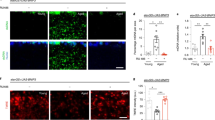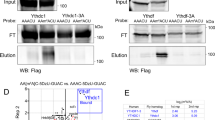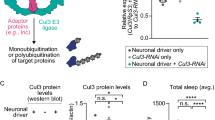Abstract
The study of age-related memory impairment (AMI) has been hindered by a lack of AMI-specific mutants. In a screen for such mutants in Drosophila melanogaster, we found that heterozygous mutations of DCO (DCO/+), which encodes the major catalytic subunit of cAMP-dependent protein kinase (PKA), delay AMI more than twofold without affecting lifespan or memory at early ages. AMI is restored when a DCO transgene is expressed in mushroom bodies, structures important for olfactory memory formation. Furthermore, increasing cAMP and PKA activity in mushroom bodies causes premature AMI, whereas reducing activity suppresses AMI. In Drosophila AMI consists of a specific reduction in memory dependent on the amnesiac (amn) gene. amn encodes putative neuropeptides that have been proposed to regulate cAMP levels in mushroom bodies. Notably, both the memory and AMI defects of amn mutants are restored in amn;DCO/+ double mutants, suggesting that AMI is caused by an age-related disruption of amn-dependent memory via PKA activity in mushroom bodies.
This is a preview of subscription content, access via your institution
Access options
Subscribe to this journal
Receive 12 print issues and online access
$209.00 per year
only $17.42 per issue
Buy this article
- Purchase on Springer Link
- Instant access to full article PDF
Prices may be subject to local taxes which are calculated during checkout







Similar content being viewed by others
References
Rosenzweig, E.S. & Barnes, C.A. Impact of aging on hippocampal function: plasticity, network dynamics, and cognition. Prog. Neurobiol. 69, 143–179 (2003).
Foster, T.C. Regulation of synaptic plasticity in memory and memory decline with aging. Prog. Brain Res. 138, 283–303 (2002).
Horiuchi, J. & Saitoe, M. Can flies shed light on our own age-related memory impairment? Ageing Res. Rev. 4, 83–101 (2005).
Saitoe, M., Horiuchi, J., Tamura, T. & Ito, N. Drosophila as a novel animal model for studying the genetics of age-related memory impairment. Rev. Neurosci. 16, 137–149 (2005).
Kim, D.W. & Choi, J.H. Effects of age and dietary restriction on animal model SAMP8 mice with learning and memory impairments. J. Nutr. Health Aging 4, 233–238 (2000).
Kinney, B.A., Meliska, C.J., Steger, R.W. & Bartke, A. Evidence that Ames dwarf mice age differently from their normal siblings in behavioral and learning and memory parameters. Horm. Behav. 39, 277–284 (2001).
Liu, R. et al. Reversal of age-related learning deficits and brain oxidative stress in mice with superoxide dismutase/catalase mimetics. Proc. Natl. Acad. Sci. USA 100, 8526–8531 (2003).
Sampayo, J.N., Gill, M.S. & Lithgow, G.J. Oxidative stress and aging—the use of superoxide dismutase/catalase mimetics to extend lifespan. Biochem. Soc. Trans. 31, 1305–1307 (2003).
Markowska, A.L. Life-long diet restriction failed to retard cognitive aging in Fischer-344 rats. Neurobiol. Aging 20, 177–189 (1999).
Yanai, S., Okaichi, Y. & Okaichi, H. Long-term dietary restriction causes negative effects on cognitive functions in rats. Neurobiol. Aging 25, 325–332 (2004).
Lupien, S.B., Bluhm, E.J. & Ishii, D.N. Systemic insulin-like growth factor-I administration prevents cognitive impairment in diabetic rats, and brain IGF regulates learning/memory in normal adult rats. J. Neurosci. Res. 74, 512–523 (2003).
Markowska, A.L., Mooney, M. & Sonntag, W.E. Insulin-like growth factor-1 ameliorates age-related behavioral deficits. Neuroscience 87, 559–569 (1998).
Sonntag, W.E., Ramsey, M. & Carter, C.S. Growth hormone and insulin-like growth factor-1 (IGF-1) and their influence on cognitive aging. Ageing Res. Rev. 4, 195–212 (2005).
Tully, T. et al. A return to genetic dissection of memory in Drosophila. Cold Spring Harb. Symp. Quant. Biol. 61, 207–218 (1996).
Tamura, T. et al. Aging specifically impairs amnesiac-dependent memory in Drosophila. Neuron 40, 1003–1011 (2003).
Waddell, S., Armstrong, J.D., Kitamoto, T., Kaiser, K. & Quinn, W.G. The amnesiac gene product is expressed in two neurons in the Drosophila brain that are critical for memory. Cell 103, 805–813 (2000).
Heisenberg, M. Mushroom body memoir: from maps to models. Nat. Rev. Neurosci. 4, 266–275 (2003).
Skoulakis, E.M., Kalderon, D. & Davis, R.L. Preferential expression in mushroom bodies of the catalytic subunit of protein kinase A and its role in learning and memory. Neuron 11, 197–208 (1993).
Grotewiel, M.S., Beck, C.D., Wu, K.H., Zhu, X.R. & Davis, R.L. Integrin-mediated short-term memory in Drosophila. Nature 391, 455–460 (1998).
Skoulakis, E.M. & Davis, R.L. Olfactory learning deficits in mutants for leonardo, a Drosophila gene encoding a 14-3-3 protein. Neuron 17, 931–944 (1996).
Tully, T. & Quinn, W.G. Classical conditioning and retention in normal and mutant Drosophila melanogaster. J. Comp. Physiol. A 157, 263–277 (1985).
Lane, M.E. & Kalderon, D. Genetic investigation of cAMP-dependent protein kinase function in Drosophila development. Genes Dev. 7, 1229–1243 (1993).
Drain, P., Folkers, E. & Quinn, W.G. cAMP-dependent protein kinase and the disruption of learning in transgenic flies. Neuron 6, 71–82 (1991).
Li, W., Tully, T. & Kalderon, D. Effects of a conditional Drosophila PKA mutant on olfactory learning and memory. Learn. Mem. 2, 320–333 (1996).
Crittenden, J.R., Skoulakis, E.M., Han, K.A., Kalderon, D. & Davis, R.L. Tripartite mushroom body architecture revealed by antigenic markers. Learn. Mem. 5, 38–51 (1998).
Brand, A.H. & Perrimon, N. Targeted gene expression as a means of altering cell fates and generating dominant phenotypes. Development 118, 401–415 (1993).
Kiger, J.A., Jr. & O'Shea, C. Genetic evidence for a protein kinase A/cubitus interruptus complex that facilitates processing of cubitus interruptus in Drosophila. Genetics 158, 1157–1166 (2001).
Nighorn, A., Healy, M.J. & Davis, R.L. The cyclic AMP phosphodiesterase encoded by the Drosophila dunce gene is concentrated in the mushroom body neuropil. Neuron 6, 455–467 (1991).
Kiger, J.A., Jr., Eklund, J.L., Younger, S.H. & O'Kane, C.J. Transgenic inhibitors identify two roles for protein kinase A in Drosophila development. Genetics 152, 281–290 (1999).
Mao, Z., Roman, G., Zong, L. & Davis, R.L. Pharmacogenetic rescue in time and space of the rutabaga memory impairment by using Gene-Switch. Proc. Natl. Acad. Sci. USA 101, 198–203 (2004).
Osterwalder, T., Yoon, K.S., White, B.H. & Keshishian, H. A conditional tissue-specific transgene expression system using inducible GAL4. Proc. Natl. Acad. Sci. USA 98, 12596–12601 (2001).
Feany, M.B. & Quinn, W.G. A neuropeptide gene defined by the Drosophila memory mutant amnesiac. Science 268, 869–873 (1995).
Deyo, R.A., Straube, K.T. & Disterhoft, J.F. Nimodipine facilitates associative learning in aging rabbits. Science 243, 809–811 (1989).
Straube, K.T., Deyo, R.A., Moyer, J.R., Jr. & Disterhoft, J.F. Dietary nimodipine improves associative learning in aging rabbits. Neurobiol. Aging 11, 659–661 (1990).
Thibault, O. & Landfield, P.W. Increase in single L-type calcium channels in hippocampal neurons during aging. Science 272, 1017–1020 (1996).
Thibault, O., Hadley, R. & Landfield, P.W. Elevated postsynaptic [Ca2+]i and L-type calcium channel activity in aged hippocampal neurons: relationship to impaired synaptic plasticity. J. Neurosci. 21, 9744–9756 (2001).
Davare, M.A. & Hell, J.W. Increased phosphorylation of the neuronal L-type Ca2+ channel Cav1.2 during aging. Proc. Natl. Acad. Sci. USA 100, 16018–16023 (2003).
Morrison, J.H. & Hof, P.R. Life and death of neurons in the aging brain. Science 278, 412–419 (1997).
Liu, S.J. et al. Tau becomes a more favorable substrate for GSK-3 when it is prephosphorylated by PKA in rat brain. J. Biol. Chem. 279, 50078–50088 (2004).
Bhattacharya, A., Lakhman, S.S. & Singh, S. Modulation of L-type calcium channels in Drosophila via a pituitary adenylyl cyclase–activating polypeptide (PACAP)–mediated pathway. J. Biol. Chem. 279, 37291–37297 (2004).
Zhong, Y. Mediation of PACAP-like neuropeptide transmission by coactivation of Ras/Raf and cAMP signal transduction pathways in Drosophila. Nature 375, 588–592 (1995).
Rosay, P., Armstrong, J.D., Wang, Z. & Kaiser, K. Synchronized neural activity in the Drosophila memory centers and its modulation by amnesiac. Neuron 30, 759–770 (2001).
Han, P.L., Levin, L.R., Reed, R.R. & Davis, R.L. Preferential expression of the Drosophila rutabaga gene in mushroom bodies, neural centers for learning in insects. Neuron 9, 619–627 (1992).
Ramos, B.P. et al. Dysregulation of protein kinase a signaling in the aged prefrontal cortex: new strategy for treating age-related cognitive decline. Neuron 40, 835–845 (2003).
Bach, M.E. et al. Age-related defects in spatial memory are correlated with defects in the late phase of hippocampal long-term potentiation in vitro and are attenuated by drugs that enhance the cAMP signaling pathway. Proc. Natl. Acad. Sci. USA 96, 5280–5285 (1999).
Barad, M., Bourtchouladze, R., Winder, D.G., Golan, H. & Kandel, E. Rolipram, a type IV–specific phosphodiesterase inhibitor, facilitates the establishment of long-lasting long-term potentiation and improves memory. Proc. Natl. Acad. Sci. USA 95, 15020–15025 (1998).
Frey, U., Huang, Y.Y. & Kandel, E.R. Effects of cAMP simulate a late stage of LTP in hippocampal CA1 neurons. Science 260, 1661–1664 (1993).
Dura, J.M., Preat, T. & Tully, T. Identification of linotte, a new gene affecting learning and memory in Drosophila melanogaster. J. Neurogenet. 9, 1–14 (1993).
Tully, T., Preat, T., Boynton, S.C. & Del Vecchio, M. Genetic dissection of consolidated memory in Drosophila. Cell 79, 35–47 (1994).
Acknowledgements
We thank D. Kalderon for DCO mutants and antibody to DCO, J.D. Armstrong and L.C Griffith for enhancer GAL4 lines, J. Kiger for the UAS-PKAc and PKI strains, R. Davis for the MB-Switch strain and A. Hattori for help with statistical analyses. This work was funded by a Grant-in-Aid for Scientific Research (B) (14380374) and Scientific Research on Priority Areas–Integrative Brain Research (17021052) from the Ministry of Education, Culture, Sports, Science and Technology of Japan and The Uehara Memorial Foundation.
Author information
Authors and Affiliations
Contributions
D.Y and J.H performed most of the experiments and analyzing the data. Y.N. performed experiments shown in Figure 5 and Supplementary Figure 2 with M.S. S.N. performed experiments shown in Supplementary Figure 1. T.T. performed initial behavioral screening shown in Figure 1. M.S. designed the research project and wrote the manuscript together with J.H.
Corresponding author
Ethics declarations
Competing interests
The authors declare no competing financial interests.
Supplementary information
Supplementary Fig. 1
P-GAL4 expression patterns in adult brains. (PDF 2673 kb)
Supplementary Fig. 2
Induction of PKI by feeding RU486. (PDF 185 kb)
Rights and permissions
About this article
Cite this article
Yamazaki, D., Horiuchi, J., Nakagami, Y. et al. The Drosophila DCO mutation suppresses age-related memory impairment without affecting lifespan. Nat Neurosci 10, 478–484 (2007). https://doi.org/10.1038/nn1863
Received:
Accepted:
Published:
Issue Date:
DOI: https://doi.org/10.1038/nn1863
This article is cited by
-
Modelling TDP-43 proteinopathy in Drosophila uncovers shared and neuron-specific targets across ALS and FTD relevant circuits
Acta Neuropathologica Communications (2023)
-
RNP components condense into repressive RNP granules in the aging brain
Nature Communications (2022)
-
Structural aspects of plasticity in the nervous system of Drosophila
Neural Development (2018)
-
Genetic variation in glia–neuron signalling modulates ageing rate
Nature (2017)



